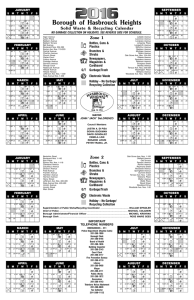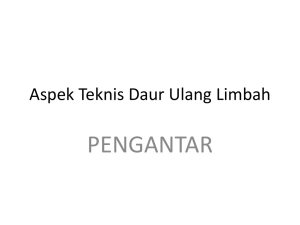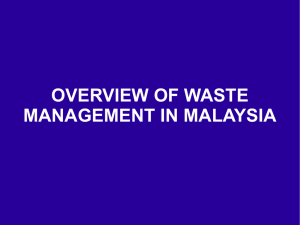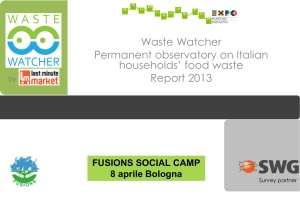Library PowerPoint - FSU Faculty/Staff Personal Page Web Server
advertisement
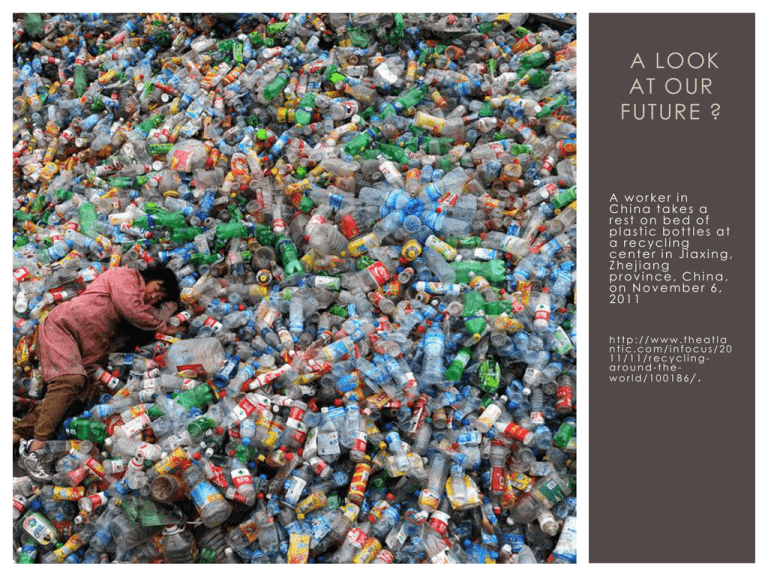
A LOOK AT OUR FUTURE ? A worker in China takes a rest on bed of plastic bottles at a recycling center in Jiaxing, Zhejiang province, China, on November 6, 2011 http://www.theatla ntic.com/infocus/20 11/11/recyclingaround-theworld/100186/. INTRODUCTION TO CARTOGRAPHY --GEOG. 310 Recycling – Across the Planet Dr. F. Kessler 9 October 2014 TERMS TO CONSIDER Leachate -- water percolates through a solid leaching out some of the components Use of resources --- for new products & recycling processes Industry --- jobs, income, etc. Environment Materials --- glass, paper and newsprint, cardboard, steel, aluminum, copper, iron, plastics, electronics, rubber (tires), organic waste, batteries (ex. NiCad containing nickel and cadmium), gold, silver, Freon, aggregates and concrete, asphalt and tarmac, bricks, ink jet printer cartridges, paint, textiles, mine chat waste, ship salvage, cars (all parts), pesticides, herbicides, fertilizers, and possibly other materials. Landfills FYI --- If the links require a password or state an issue with security, please copy and paste the link. Some of the links are slow, patience please. AREAS TO USE FOR MAPPING For a look at recycling world wide with a variety of options and how the United States ranks go to --- Getting Wasted: Recycling Stats from Around the World http://www.care2.com/causes/getting -wasted-recycling-statsfrom-around-the-world.html Global Trade in Electronic Waste http://www.pbs.org/frontlineworld/stories/ghana804/map/map .html Lead acid batteries from Ghana successfully recycled [ in Germany. This provides a topic where collection and recycling take part in two different countries. http://www.oeko.de/en/press/press -releases/archive-pressreleases/2014/lead -acid-batteries-from-ghana-successfullyrecycled/ RECYCLING The proces s of re -usi ng a giv en product (bey ond its intended use), or producing a new product from a recyclable material. Recycling is more commonl y associated with the process where ol d goods are re manufactured , al l owing them to be turned into new products The v irtue of recycl ing has been appreciated for centuri es . For thousands of years metal items hav e been recycl ed by mel ting and reformi ng them into new weapons or tool s. I t is said that the broken pieces of the Col ossus of Rhodes , a statue deemed one of the sev en wonders of the ancient worl d, were recycled for scrap. During the industrial rev ol ution, recycl ers began to form businesses and l ater trade associati ons , deal ing in the col l ecti on, trade and proces si ng of metal s and paper. A merica's I nstitute of Scrap Recycl ing I ndustries (I SRI ), a trade associati on with more than 1,400 member companies , traces its roots back to one such organi zati on founded in 1913. I n the 1930s many people surv iv ed the Great Depression by peddling scraps of metal, rags and other items. I n those days reuse and recycl i ng were often economi c necessi ti es . Recycl ing al so pl ayed an important rol e during the second worl d war, when scrap metal was turned into weapons . WASTE MANAGEMENT The processes involved in dealing with the waste of humans and o r g an i sm s , i n c l udi ng m i n i m i zati o n, h an d l i ng , p r o c e s s i ng , s t o r ag e , r e c y c l ing , t r ans port , and f i n al d i s p o sal . D i c t i o n a r y . c o m ' s 2 1 st C e n t u r y L e x i c o n C o p y r i g h t © 2 0 0 3 - 2 0 1 4 W as t e m an ag e m e n t i s t h e p r ac t i c e o f c o l l e c ti ng an d d i s p o si ng o f t h e w as t e p r o d u c ed b y h u m an ac t i v iti e s. F o r e x am p l e , w h e n a p e r s o n b u y s a p r o d u c t an d t h e n d i s p o se s o f i t s p l as t i c p ac k ag i n g , t h at p ac k ag i ng b e c o m e s w as t e . O n c e w as t e i s i n t ro duc e d i n t o an e n v i ro nm e n t, i t c an p r o d u c e m an y h ar m f u l e f f e c t s , s u c h as t h e s p r e ad o f d i s e ase . W as t e m an ag e m e n t i s v i t al t o t h e h e al t hy f u n c t i o ni ng o f a s o c i e t y. T h r o u g h o ut h i s t o ry, s an i tati o n i s s u e s h av e b e e n t o b l am e f o r d i s e ase o u t b r e aks an d e p i d e mi c s i n m o s t p o p u l at ed r e g i o n s o f t h e w o r l d. I m p ro p e r w as t e m an ag e m e n t h as n e g at i v e af f e c t s o n i n d i v idu al h e al t h, an d s i m i l arly i t al s o n e g at i v e l y i m p ac t s e n v i ron m e nt al h e al t h. P o s i ti v e w as t e m an ag e m e n t s y s t e m s, h o w e v e r, c an p r e v en t t h e n e g at i v e i m p ac t s w as t e h as o n t h e e n v i ro n m en t. R e c y cl i ng , o r r e u s i ng m at e r i al s t h at hav e al r eady been u s e d o n c e , i s an e n v i ro n me ntal ly fr i endl y w ay o f u t i l izi n g w as t e . U s i n g t h e g as t h at d e c o m p o s i ng o r g an i c m at e r i al s g i v e o f f i n l an d fi l ls as a s o u r c e o f e n e r g y i s an o t h e r p o s s i b l e w ay f o r w as t e m an ag e m e n t t o f u n c t i o n i n a g r e e n w ay . http://www.ecomii.com/ecopedia/waste -management GLOBAL WASTE MANAGEMENT Wh a t a w a s t e : A G l o b a l R e v i e w o f S o l i d Wa s t e M a n a g e m e nt p r o v i d e s b a c k gr o und , s t a t i s ti c s o n a l a r g e n u m b e r o f a r e a s , c o m p a ri so ns a m o ng c o un t ri e s, a n d v a ri o us c o m p on e n t s o f w a s t e m a n a g e m e nt h t t p :/ / w e b .w orl db a nk .o r g /WB SI T E / E XT E R N A L /T O PI C S / E XT UR BA N DE VE L O PM E NT /0 ,,c o n t e n tM D K:2 3 1 7 2 8 8 7 ~ p a g e P K:2 1 0 0 5 8 ~ p i PK:2 1 0 0 6 2 ~ t he Si t e PK:3 3 7 1 7 8 ,0 0 .h t m l Wa s t e m a n a g e m e nt : F a c t s h e e t h t t p :/ / w w w.g dr c .o r g /u e m /w a st e /w a st e f a c t s he e t .h t m l R i si ng p r o sp e ri t y a n d t h e i n c r e a si ng u r b a ni sa ti o n o f t h e w o rl d p o p ul a ti o n c o ul d l e a d t o a d o u b l ing i n t h e v o l um e o f m u ni ci p a l s o l i d w a s t e (M S W) c r e a t e d a n n u a l l y b y 2 0 2 5 , a c c o r di ng t o n e w r e s e a r c h c o n duc t e d b y t h e Wo r l d Wa t c h I n sti t u t e - a n i n d e p e n d e nt r e s e a r c h o r g a ni sa ti on d e d i c a t e d t o g l o ba l e n v i ro nm e nt a l c o nc e rn s. h t t p :/ / w ww .w a st e - m a n a g e m e nt w o rl d .c o m /a r ti cl e s/ 2 0 1 2 / 0 7 /gl o ba l - m uni ci pa l - so l id - wa st e - to - d o ubl e - by 2 0 2 5 .h t m l Wa s t e M a n a g em e nt a n d r e c y cl i ng i n A si a p r o v i de s a n o v e rv i ew o f t h e i s su es a n d i nd us t r y h t t p :/ / w w w .r e v e n t ur e p a r k .c o m /upl o a ds /1 _ C WR _ A R T _ 1 1 .p d f PLASTICS Graphs and data for plastics http://www.containerrecycling.org/index.php/plastic -data PET is polyethylene terephthalate . PET is the plastic labeled with the #1 code . Many beverages, food items and other consumer products are delivered in bottles or packages made from PET. The #1 code is usually found on or near the bottom of the container. Used to make new bottles, recycled PET can also be made into fiber for carpets; fabric for t -shirts or fleece jackets; fiberfill for sleeping bags, winter coats, and dog beds; industrial strapping; sheet and thermoformed (clam shell) packaging; and automotive parts such as headliners, bumpers, and door panels. UBIQUITOUS PLASTICS Statistics and information about the issue of plastics and recycling in Australia http://www.cleanup.org.au/au/Campaigns/plastic -bagfacts.html Clean Up – Plastic bag usage around the world http://www.cleanup.org.au/PDF/au/cua_plastic_bag_usage_ar ound_world_april_2010.pdf Bottled water: Pouring resources down the drain http://www.container-recycling.org/index.php/issues/bottled water/276-bottled-water-pouring-resources-down-the-drain- ELECTRONICS --- E WASTE Electronic trash contains an enormous amount of toxic materials. Facts and figures on e -waste and recycling Facts and figures http://www.electronicstakeback.com/wp content/uploads/Facts_and_Figures_on_EWaste_and_Recyclin g.pdf Statistics on the management of used & end -of-life electronics http://www.epa.gov/osw/conserve/materials/ecycling/manag e.htm Cell phones -- next to computers &monitors , cell phones are becoming one of the leading sources of electronic trash http://www.benefits -of-recycling.com/recyclingcellphones / PAPER RECYCLING Confederation of European Paper I ndustries Key statistics are included for 2013 which include recycling data begins on page 19. You may want to review earlier data for background. http://www.cepi.org/system/files/public/documents/publicatio ns/statistics/2014/Final%20Key%20statistics%202013.pdf European Recovered Paper Council includes the European Declaration on Paper Recycling for 2011 – 2015. Using the Paper Monitoring Recycling Report , you will get an overview of the industry as well as a map of countries and the organization that provides data. http://www.forestindustries.fi/mediabank/882.pdf INTERNATIONAL RECYCLING Bureau of I nternational Recycling. The Ferrous metals (steel ) and Paper provides excellent statistics. Other areas indicated password protection. The web site still provides an overview. http://www.bir.org/industry/ferrous -metals/ Bureau of I nternational Recycling A nnual Report 2013 has some data but gives an excellent ov erview of the industry http://www.bir.org/assets/Documents/publications/Annual Reports/BIR-AnnualReport2013-V07.pdf Eurostat Data Point to Recycling I ncrease http://www.recyclinginternational.com/recycling news/6178/research -and-legislation/europe/eurostat -data-pointrecycling -increase Scientists: Origins of Ocean Plastics Can be Traced http://www.recyclinginternational.com/recycling news/8146/research -and-legislation/australia/scientists -originsocean-plastics-can-be-traced MORE – INTERNATIONAL RECYCLING Chemicals and hazardous waste: Three conventions convene in Geneva. This site provides information about international laws and participants. http://www.bafu.admin.ch/dokumentation/medieninformation /00962/index.html?lang=en&esgi -id=48429 Basel Agreement on the control of transboundary movements and hazardous wastes and their disposal. Provides background information. http://legal.un.org/avl/ha/bcctmhwd/bcctmhwd.html Geo-Mexico, the geography and dynamics of modern Mexico includes information on a new bio -energy project in Monterrey which will reduce emissions by the equivalent of a million tons of CO2. The World Bank is helping to finance the project. http://geo-exico.com/?tag=recycling INTERNATIONAL RECYCLING – STILL MORE “Assessment of the Recycling Potential of Aluminum in Japan, the United States, Europe and China” from Materials Transactions, Vol. 50 #3, (2009), pp. 650 -656. Gives insight into the increase of aluminum usage and the subsequent need for recycling. Note the references at the end of the article. https://www.jim.or.jp/journal/e/pdf3/50/03/650.pdf Highest recycling rates in Austria and Germany – but UK and Ireland show fastest increase contains data/statistics for individual country reports http://www.eea.europa.eu/publications/managing -municipalsolid-waste INDIA & RECYCLING The Himalayas and trash http://timesofindia.indiatimes.com/home/environment/develo pmental -issues/Mountain -of-trash-may-be-driving-Himalayasto-disaster/articleshow/41913815.cms?prtpage=1 India and plastics http://www.plasticsnews.com/article/20130501/news/13050999 8/india-reports-plastic-waste-and-recycling-statistics# Mumbai (Dhavari), I ndia: A Recycling Miracle http://sustainablebusinessforum.com/sbtoolkit/73201/india -sdharavi-recycling-slumdog-entrepreneurs and also http://news.bbc.co.uk/2/hi/science/nature/7354977.stm Attero ready to 'fill the gap' in India's e -cycling http://www.recyclinginternational.com/recycling -news/8145/escrap-and-batteries/india/attero -ready-039-fill-gap-039-india039-s-e-cycling SWEDEN & RECYCLING “A Cross-Country Study of Household Waste Prevention and Recycling: Assessing the effectiveness of Policy Instruments” by Ferrara and Missios. Land Economics, November 2012, 88 (4): 710-744. “Municipal Waste Management in Sweden.” Leonidas Milios. Feb. 2013. Copenhagen Resource Institute, http://www.cri.dk / Sweden is hungry for trash and has turned to Norway for an offer it would find hard to refuse, no pun intended. Sweden is asking its neighbor for trash. Sweden's success is Sweden's problem. Sweden is a model recycler. Thanks to a highly efficient waste management system in Sweden, the vast majority of this household waste can be recovered or reused http://phys.org/news/2012 -10-sweden-norway-trashlots.html#jCp RESOURCES U. S. Environmental Protection Agency http://www.epa.gov / Natural Resources Defense Council –Recycling http://www.nrdc.org/recycling/ National Center for Electronics Recycling www.electronicsrecycling.org/public/ Bureau of I nternational Recycling www.bir.org European Environmental Agency www.eea.europa.eu/ For individual countries http://www.eea.europa.eu/publications/managing municipal-solid-waste United Nations Environmental Programme www.unep.org Waste management World http://www.waste-managementworld.com/index.html RESOURCES These resources can be used for further research: http://tryc2.com/e -waste-recycling/ http://www.georgetowncollege.edu/georgetonian/2014/03/stud ent-explains-sustainability -initiative/ http://www.coexploration.org/howsthewater/html/body_earth.h tml http://www.clean-energy-ideas.com/energy/energy dictionary/recycling -definition http://www.economist.com/node/9249262 http://en.wikipedia.org/wiki/Recycling_by_product ORT LIBRARY RESOURCE Ort Library home page http://www.frostburg.edu/lewis -ortlibrary/ Use OneSearch found on the. Remember to use the limiters found on the left of the screen. Geography specific subject guide will provide databases, reference materials, eBooks, and websites http://libguides.frostburg.edu/geog For the library catalog use http://www.frostburg.edu/lewis -ortlibrary/ and click on catalog. Remember that you can click on FSU for materials in our collection or USMAI catalog for materials within the system libraries. Citation information can be found at http://www.frostburg.edu/lewis -ort-library/style/ THE NEXT STEP – DATA & MAPPING If you have any questions, please contact: MaryJo A. Price ---- mprice@frostburg.edu 301 -687-4889 Stop at the Reference Desk, floor 2 or call 301 -687-4424 Use Libref or Ask a Librarian -- libref@frostburg.edu Use AskUsNow, reference chat service --- Click on link on library home page Confer with Dr. Kessler throughout the assignment for assistance including access to the PowerPoint.
